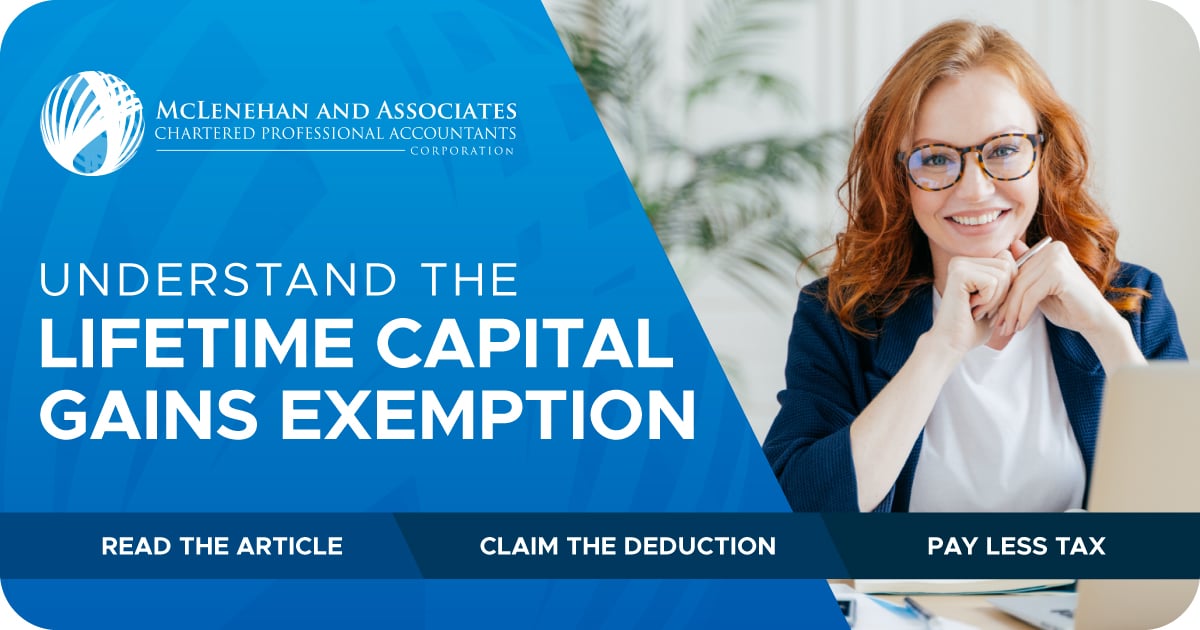Understand the Lifetime Capital Gains Exemption
The Lifetime Capital Gains Exemption (LCGE) allows Canadian incorporated small business owners to claim a deduction when selling shares of a...

As a sole proprietor, you may be looking back at last year’s results and ahead to the time you have to pay your taxes, and wondering whether you might not be better off incorporating to control the income tax expense on earned income.
The incorporation process is relatively simple whether you incorporate provincially or federally.
The following are a few areas to consider when you think about incorporating your business:
Naming the Company
The corporation can have a name company or a number. If you incorporate using a number, you may also use a name (i.e., 1234567 Ontario Ltd. could also register itself as “Able’s Horse Stable”.) This name becomes “attached” to the registered number.
When conducting business using the trade name, you must still identify the company by its registered name. For instance, sales invoices could show “Able’s Horse Stable” but should indicate that the actual incorporation name is 1234567 Ontario Ltd.
The name chosen cannot be either identical or deceptively similar to existing registrants in the province. The name or number must be identified as a corporation by using the French or English forms of “limited” or “incorporated”.
Location
The head office of a provincially incorporated company must be located in the province of incorporation. The head office is usually at the same location as the operations but, if there is more than one operating location, a choice can be made.
Ownership
Ownership and control are determined by the number of shares held.
Shares must be issued in order for the company to be owned. The owners must decide among themselves the minimum number of shares that will be owned by each shareholder. The shares provide the owners with voting rights. Whether the corporation issues 10,000 or only 50 common shares with voting rights, the degree of ownership and control are determined by the proportion held by each individual. The value of each share is decided at the time of issue. If share value was set at $10 per share, then the holder of, say, 5,000 shares would have to remit $50,000 to the corporation to purchase ownership.
Private corporations may not have more than 50 shareholders. The residential addresses of all shareholder(s) must be provided for notification purposes.
Directors
All corporations must appoint at least one Canadian resident as a director. If four or more directors are appointed, 25% must be Canadian residents. The residential address of the directors must be provided along with the residency status.
Officers
In owner-managed businesses, it is not unusual for the shareholder(s), director(s) and officer(s) to be one and the same. It is not a requirement for officers to own shares or be directors of the corporation. However, in that officers manage the operations of the company, they are held to a high standard of stewardship and thus the appointments should not be taken lightly. The residential addresses of the officers must be provided.
Year-End Date
You will have to determine a fiscal year-end date for the corporation. Depending upon the date of incorporation and the business cycle, you may choose a year end other than the calendar year end. It is advisable to speak to your CPA about the best month end for your type of business and to maximize tax-deferral possibilities.
Auditor or Accountant?
Provincial acts of incorporation may require audits of financial statements. This requirement can be waived for non-publicly traded companies as long as all of the shareholders agree to waive the audit provision. Consent to waive an audit is required each year. Most business owners, their banks and creditors do not require audited financial statements; waiving audit provisions in favour of reports provided by a CPA is an acceptable alternative.
Even though the appointment of an auditor may not be required, it is wise to consider appointing a CPA as part of the incorporation process to assist in setting up the required books and records, tax accounts, business number, WSIB, employee payroll remittance accounts, HST or PST accounts and all the other regulatory registrations that may be specific to your business.
Seek Professional Advice
Incorporation requirements vary from province to province. The guidelines above are provided as general consideration as to what is normally required.
Entrepreneurs considering incorporation should seek professional assistance in their jurisdiction to ensure the appropriate steps and documentation meet the requirements under their provincial incorporation act.

The Lifetime Capital Gains Exemption (LCGE) allows Canadian incorporated small business owners to claim a deduction when selling shares of a...

Incorporated small business owners may be able to take tax-free cash out of their corporation through the capital dividend account.

There are many tax advantages for self-employed Canadians who work from home and hire family members in their business.